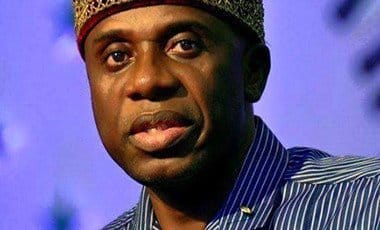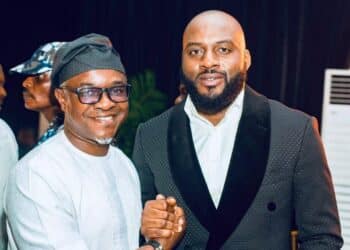THERE was a heated argument at the House of Representatives Hearing Room 028 on Monday between Minister of Transportation Rotimi Amaechi and House Committee Chairman on Treaties, Particulars and Agreement Ossai Nicholas Ossai during the legislative hearing on the alleged $33 billion loans agreements signed by the ministry.
The minister denied any such agreement.
The drama unfolded before Minister of Works and Housing Babatunde Fashola and the Minister of Federal Capital Territory (FCT) Muhammed Bello.
Amaechi, who had warned the committee against scrutinising the Chinese loans, repeated his position that Nigeria might lose the opportunity of a loan to fund the Lagos-Calabar coastal rail line and the people of Southsouth will be denied that project because “of the committee, you set up to investigate the Chinese loans.”
Ossai (PDP Delta), frowned at the “misconception and misgivings” on the legislative scrutiny of various agreements signed by government officials.
He said: ”We have heard some people ask why we are focusing on only Chinese-related loans and commercial contracts. We will like Nigerians to know that we aren’t focusing on only Chinese loans. From what we know, Nigeria has over 500 bilateral loan and commercial contracts agreements and investments treaties with different countries and institutions.
”There is no way the committee will do a thorough job without segmenting the issues based on countries, institutions, or MDAs. Thus, it must be clearly noted that this is not targeted at only China, neither was it designed to impede the development of the railway sector and other infrastructures.
“But rather to ensure full disclosure, transparency, accountability, utmost good faith, and value for money in both the bilateral loans and commercial contracts agreements entered into by the Nigerian government.
“The loan agreements we have seen so far, show that government officials charged with the responsibility of representing Nigeria were more desperate to just take the loans at any condition, possibly using non-negotiated loan agreements templates rather than go through the rigour of diligent technical review of negotiating specific clauses with clarity and for the national interest.
”For instance, it’s a common practice that most international loan agreements would adopt ‘Sovereign guarantee’ and a neutral international arbitration centre as opposed to waiving of our national sovereignty in an omnibus manner; especially in dealing with countries like China, known to possess an absolute state status on their institutions and corporations.
“However, the immunity clauses in most of these agreements before us are not only ambiguous but very obscure. And without recourse to the fact that the Nigerian government had issued circular on the subject matter with reference number SGF/OP/S.3/X/ 1737 dated 11th August 2014 that provided a guideline on issues of waiver of sovereign immunity clause during the loan and commercial agreements negotiations.
”We expected government officials negotiating and signing these loans to fully comply with this guideline and also ensure that the clauses are couched to clearly reflect same”.
Questioning the rationale behind accepting Hong Kong as arbitration centre for the Chinese loans secured by Nigeria, he said “arbitration centres for bilateral loan agreements are known to be generally on neutral grounds unlike what we have in most of the Nigeria/China agreements where Hong Kong that is also governed by China laws was designated as the Arbitration Centre.
“From our experience, the MDAs sign these commercial agreements in billions of dollars, then go to the President and Federal Executive Council for approval to execute, including securing loan facilities through Ministry of Finance and Debt Management Office (DMO) and then proceed to negotiate the terms of these loans before coming back to Mr President who then writes the National Assembly asking for approval for billions of dollars to do projects without attaching the negotiated loan and commercial contracts agreement details.
“This approach is the reason we have government representatives signing empty pages of loan agreements repayment schedule and other key documents required for the loan agreements to become effective. We have commercial contracts signed in US dollars, while the loan agreements for the execution of the same contracts were signed in Chinese YUAN currency in Ministry of Communications and Digital Economy/Galaxy Backbone Limited.
”We have noticed from documents available to us that commercial contracts signed by the federal ministry of transportation alone are over $33 billion without any clearcut financing arrangements. Most of these commercial contracts agreements didn’t also have local content clauses and more witnessed by none properly designated and authorized officials.
”We have noticed from documents available to us that commercial contracts signed by the federal ministry of transportation alone are over $33 billion without any clearcut financing arrangements. Most of these commercial contracts agreements didn’t also have local content clauses and more witnessed by none properly designated and authorized officials.
”There are observable issues relating to the procurement process, evidence of 15% advanced payments, payment of management fees, drawdown process and remittances and a whole lot of other matters, which we are strongly poised to ask questions on and hopes to get honest answers that will fine-tune the current process, plan for the possible renegotiation of some these agreements in order serve Nigerians better.
While dismissing the claim of an existing $33 billion contract signed by the Ministry, Amaechi demanded evidence of the contract from the Committee. He said: “Mr Chairman, if you say that the ministry has awarded a contract of $33 billion, we would want to see it because the only contract Ministry of Transportation has awarded so far is $1.6 billion for Lagos/Ibadan (rail project).
“The Implication of having a $33 billion contract is that be will have a large number of workers. There are no $33 billion contracts in the Ministry of contract. What we have is the $1.6 billion contract awarded under President Buhari and $800 million contracts awarded under President Goodluck Jonathan. By the time, the contract signed under President Jonathan had been completed, 80 per cent and so, we didn’t have to do anything about local content or no local content.
“The only one we had to deal with the issue of local content which is the only contract we have for now is the $1.6 billion contract awarded from Lagos to Ibadan of which the Chinese government is providing $1.2 and wed are providing the remaining $400 million. There are over 20,000 workers on that project with only 560 of them being Chinese. We need to begin to say the truth to Nigerians.”










